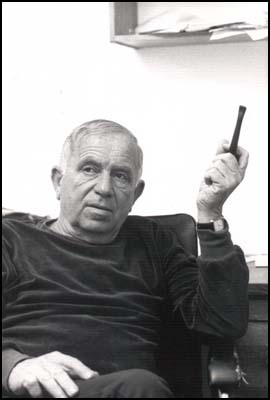 Born in Germany, Yehuda Amichai emigrated to Israel when he was twelve.
One of the great love poets of modern times, his poems are at once humorous
and filled with grief.
Born in Germany, Yehuda Amichai emigrated to Israel when he was twelve.
One of the great love poets of modern times, his poems are at once humorous
and filled with grief.
 Born in Germany, Yehuda Amichai emigrated to Israel when he was twelve.
One of the great love poets of modern times, his poems are at once humorous
and filled with grief.
Born in Germany, Yehuda Amichai emigrated to Israel when he was twelve.
One of the great love poets of modern times, his poems are at once humorous
and filled with grief.
It is one of
Amichai's richest accomplishments that he, by writing in the modern Hebrew
spoken on the streets and in the shops and homes of Israel, helped created
a vernacular literature for the new nation. Modern Israel, created
largely by European Jewish immigrants, had at the outset a language problem.
Immigrants spoke various languages, chief among the Yiddish. But
a new nation, a Jewish state, demanded (as the founders of Israel saw it)
a language appropriate to a Jewish state. European languages would
not suffice: the Jewish homeland should speak Hebrew. But "Hebrew"
was basically a classical language, preserved in books and texts; it was
not supple enough to deal with the modern world, with all its innovations,
technologies, new orientations. So a new language was invented, based
on classical Hebrew but formed to meet the needs of a society both religious
and secular, both rabbinic and political, both spiritual and commercial.
Establishing this new language was a matter not just of shaping it, nor
even of teaching people how to
speak it: the new language required central texts that would affirm its
power, its range, its usefulness, its richness. Just a Dante helped
solidify vernacular Italian by choosing to write in the demotic instead
of classical Latin, just as Chaucer helped solidify English by writing
a great epic in the language of everyday life, so Amichai helped solidify
modern Hebrew as a language. Owing in large measure to his example,
vernacular Hebrew has become the literary language of Israel, instead of
the language of the Bible.
In Amichai one
almost always encounters a delight in figurative language; yet his poems
are never pretentious or tedious, since they speak out of the everyday
and towards concerns we encounter every day. His great themes are
love and loss: he celebrates life with vibrancy and energy and a relish
for feeling, yet at the same time he is intensely aware of what is lost
as history, both personal and social, shears away from each individual
things he or she holds dear.
To hear a stimulating introduction to Yehuda Amichai's poetry by Professor Huck Gutman of the University of Vermont, click on the photo below:
To hear the presentation, you need RealAudio. If you don't already have RealAudio, you can download it easily (look carefully to find the FREE version of RealPlayer) by clicking on RealAudio.
Links
Yehuda Amichai: A Life of PoetryYou can click on Amazon.com or to Powell's Books.
Open Closed Open
Poems of Jerusalem and Love Poems
The Great Tranquility
This page created and composed by
Huck Gutman
Professor of English at the University
of Vermont
Comments by e-mail to: sgutman@zoo.uvm.edu